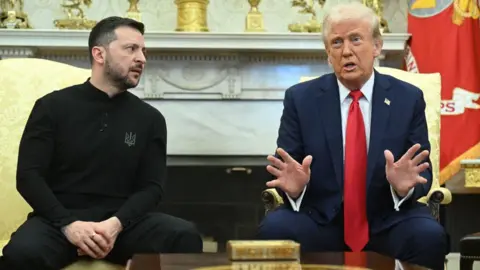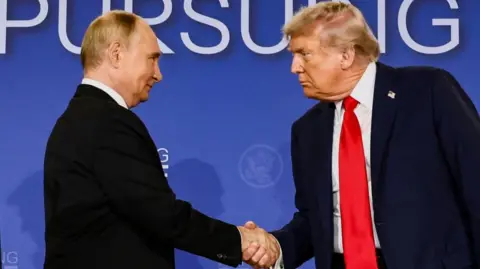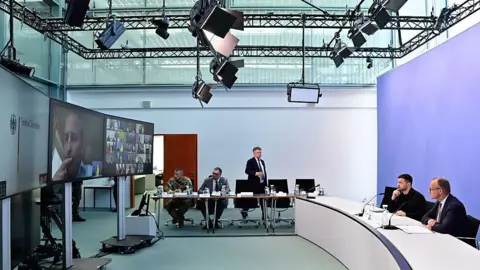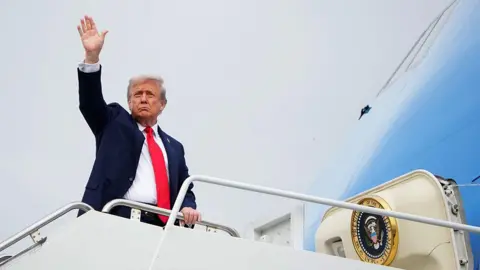BBC Diplomatic Correspondent
 Getty Images
Getty ImagesNo deal in Alaska. It was always the most likely and, in the absence of Ukrainian President Volodymyr Zelensky, perhaps the most desirable outcome.
But US President Donald Trump’s pivot away from the need for an immediate ceasefire, which he said beforehand he wanted, will have caused profound dismay in Kyiv and around Europe.
Russia’s position has long been that a ceasefire can only come in the context of a comprehensive settlement taking account of Russia’s interests – and inevitably implies Ukraine’s capitulation.
That’s the position that Trump, once again, appears to have endorsed.
“It was determined by all that the best way to end the horrific war between Russia and Ukraine,” he wrote on Truth Social, “is to go directly to a peace agreement.”
Ceasefires, he noted, “often times do not hold up”.
This appears to fly in the face of Ukraine’s main demand, endorsed by all its European backers: that an unconditional ceasefire has to come first.
Crucially, it also buys Russia’s Vladimir Putin time on the battlefield, where he is convinced he’s winning.
“If Putin’s military objective was to avoid immediate constraints on Russian operations in Ukraine then he appears to have succeeded,” says Matthew Savill, the director of military sciences at the Royal United Services Institute.
At their brief press appearance last night, Putin warned Ukraine and the Europeans not to “throw a wrench” in the works of the unspecified progress he and Trump had made.
But that, for Kyiv and its allies, is precisely what Trump has done, undoing the achievements of what they all hoped was a successful preceding week of frantic diplomacy aimed at influencing the outcome in Alaska.
It’s a reminder, as if one were needed, of Trump’s tendency to echo the views of the last person to have his ear.
For a short while this morning, European leaders will have held their breath, waiting to see if their efforts had borne fruit or been cast aside.
True to his word before the summit, Trump got on the phone to Zelensky. The two men spoke for an hour, before being joined by European leaders.
Zelensky said the call was “long and substantive” and that he would travel to Washington on Monday for his first visit since the disastrous Oval Office encounter in February.
A lot has happened since then, with Kyiv’s European allies working assiduously to repair the damage and school Zelensky in the best ways of handling the capricious and volatile occupant of the White House.
“I am grateful for the invitation,” Zelensky posted, adding “it is important that America’s strength has an impact on the situation”.
But in a later post, after Trump’s statement on Truth Social, Zelensky adopted a more urgent tone.
“Killings must stop as soon as possible,” he said. “The fire must cease both on the battlefield and in the sky, as well as against our port infrastructure.”
 Reuters
ReutersEurope’s “Trump whisperers” picked up this morning where they left off last week.
They highlighted the vital importance of involving Ukraine in conversations about its future but also paused, as they know they must regularly do, to show appreciation for Trump’s efforts.
“President Trump’s efforts have brought us closer than ever before to ending Russia’s illegal war in Ukraine,” said Sir Keir Starmer, the UK’s prime minister.
Starmer said he welcomed what he called the “openness” of the US, along with Europe, to provide “robust security guarantees” for Ukraine in the event of a deal.
If and when the fighting does eventually end, the precise nature of those guarantees will need to be spelled out in a great deal more detail than has so far been the case.
 Getty Images
Getty ImagesDespite Europe’s emerging role as Ukraine’s principal military, economic and political backer, everyone knows Ukraine’s future security cannot really be assured without the substantive backing of the US.
In her own comments on the Alaska summit, Italy’s leader, Giorgia Meloni, said guarantees for Ukraine could be “inspired by Nato’s Article 5” – the principle of collective defence signed on to by all Nato members.
Several reports this morning suggested the idea of guarantees outside Nato but equivalent to Article 5 were discussed during the latest call between Trump and European leaders.
But in the wake of Trump’s apparent about-face this morning, you can almost hear the sound of minds spinning across European capitals.
In London, the government appears to be putting on a brave face.
“If you can get that all done [a ceasefire and a peace agreement] in one go or in quick succession that’s obviously a good thing,” said a senior Downing Street source.
“But we all want to see the fighting stop”.
 Getty Images
Getty ImagesTrump has walked away from the idea of an immediate ceasefire, no doubt informed by Putin’s highly contentious account of how ceasefires broke down in the past.
The quasi-summit in Alaska already represented a cost-free win for Putin. The return of an international pariah to the international stage (albeit one festooned with unambiguous displays of American military might at the Elmendorf-Richardson airbase) and some of the trappings of a state visit.
The threat of increased US sanctions on Moscow receded too, with Trump saying it may be two or three weeks before he even has to think about it.
All this raises a host of questions about what may greet Zelensky, both on Monday in Washington and when he finally finds himself in the room with Putin and Trump.
What advice does Trump have for the Ukrainian leader, Fox’s Sean Hannity asked.
“Make a deal,” came the blunt reply. “Russia’s a very big power and they’re not.”

